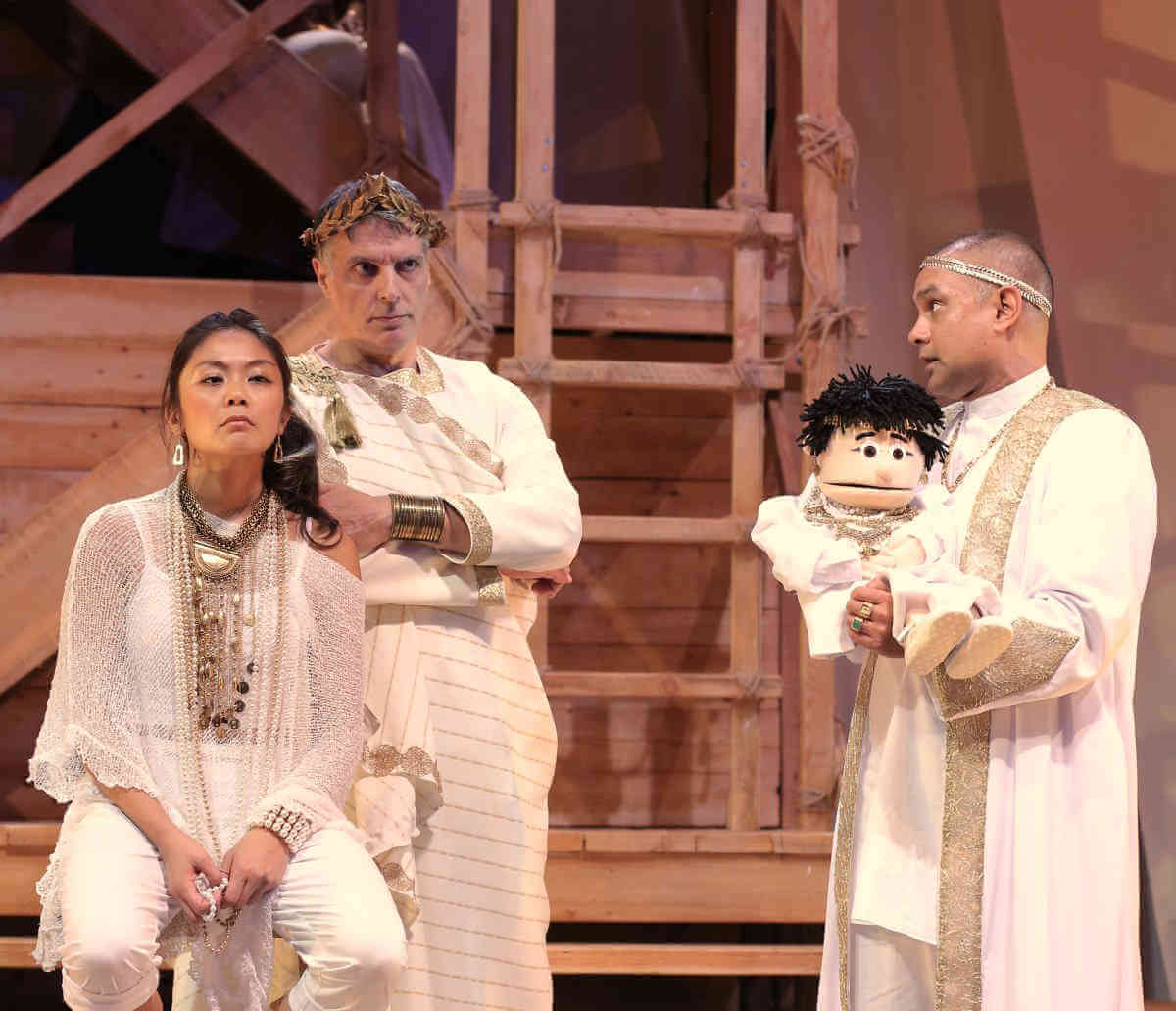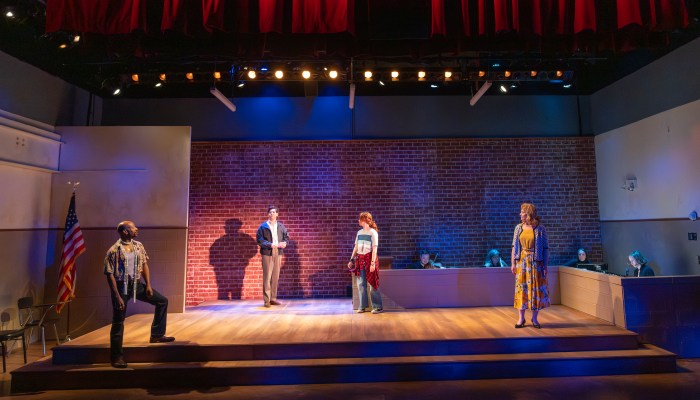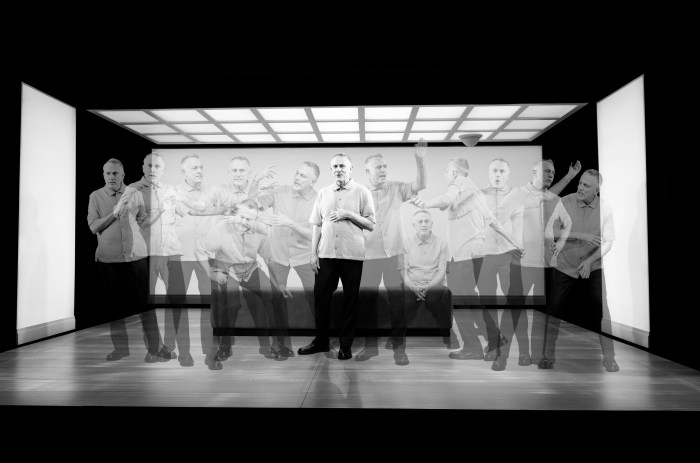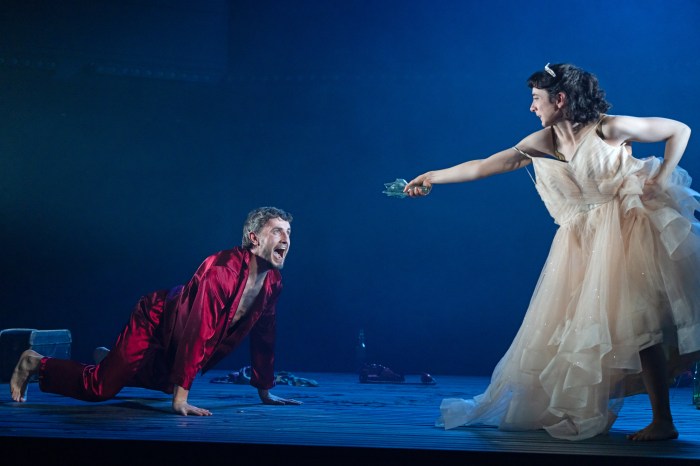Perhaps the most beloved of George Bernard Shaw’s plays — he wrote 65 of them — is “Pygmalion,” which traces the transformation of a coarse flower girl from Covent Garden into a fine, cultured lady. But more than a decade earlier, he created “Caesar & Cleopatra,” which explored similar themes of mentorship, metamorphosis, and self-actualization.
Although well received when the play debuted in 1906 and in subsequent productions starring such theater royalty as Helen Hayes, Laurence Olivier, Vivien Leigh, and John Gielgud, “Caesar & Cleopatra” has long since fallen out of favor. The 1977 Broadway revival bombed. Not only is the subject matter, loosely based on historical events circa 40 BC, too remote for modern audiences, but the drama is laden with stilted period language and a labored, chunky plot nearly impossible to digest. The work has not seen a full New York production in more than four decades. Until now.
If anyone can make sense of this overwrought material, it’s the stalwart folks at the Gingold Theatrical Group, dedicated to all things Shavian. Founding artistic director David Staller has freshly reconceived the play, guided by Shaw’s own notes and letters.
The drama, now playing at Theatre Row, has been stripped down to its essentials, eschewing spectacle to focus on characterization. This version also highlights the student-teacher dynamic between the callow Cleopatra and wise Caesar, who schools her in the ways of becoming a refined yet formidable queen. And yes, as in “Pygmalion,” the roles get flipped, with the teacher realizing he has learned from his pupil as well.
The knotty plot reflects Shaw’s obsession with classical history and humanitarian ideals. Julius Caesar (an excellent Robert Cuccioli) meets the 20-year old Egyptian queen (Teresa Avia Lim) in Alexandria, in the midst of a power struggle with Ptolemy, her younger brother and husband (that’s how they rolled back then). More than twice her age, Caesar recognizes she is “born to rule” and must snatch the throne from her brother by upping her game. He proceeds to teach her how to comport herself to project authority. There’s even a “Rain in Spain stays mainly in the plain” moment when he urges her to defiantly chant over and over, “I am Cleopatra, Queen of Egypt.”
Connecting the dots in the narrative is Cleopatra’s chief nurse, Ftatateeta, who addresses the audience intermittently throughout. Played with fervor by Brenda Braxton, she is a strong female figure that rivals Cleopatra.
There are too many subplots involving military battles, Egyptian and Roman gods, power grabs, and beheadings to recount here. It’s no surprise, however, that in the end, Cleopatra reigns supreme, primed for her next chapter — an entanglement with Mark Antony, one of Caesar’s successors after his infamous murder.
Staller has created a sort of theatrical fantasia, full of wonder and mysticism, and has chosen to mine the text for comic relief. The 10-year-old Ptolemy, for example, is portrayed by a Jim Henson-esque puppet, emphasizing the strict control that his guardian, Pothinus (Rajesh Bose), has over him. There’s a running joke where Caesar mocks Ftatateeta’s name. The scene where Caesar and his disciples must flee during a fierce siege by diving into the Mediterranean is played for laughs.
Brian Prather’s surreal set, featuring a wooden framework draped in white fabric, is a versatile backdrop for the action, whether in a palace or a seaport. Tracy Christensen’s appealing white costumes with lavish gold accessories are pitch-perfect.
The stylization is carried through in the details, like a sword made not of metal but of white foam board. Blood that is spilled is represented by a bright crimson ribbon.
On its own, this “Caesar & Cleopatra” can prove a challenge. But in the context of Shaw’s oeuvre, it’s a fascinating piece of the puzzle. And if you were lucky enough to see the recent revival of “My Fair Lady,” the musicalized version of “Pygmalion,” at Lincoln Center, the parallels are nothing short of astonishing. Kudos to Gingold for having the courage to resuscitate this highly theatrical albeit problematic work.
CAESAR & CLEOPATRA | Gingold Theatrical Group | Theatre Row, 410 W. 42nd St. | Through Oct. 12: Tue.-Thu. at 7:30 p.m.; Fri.-Sat. at 8 p.m.; Sat. at 2 p.m.; Sun. at 3 p.m. | $69 at telecharge.com or 212-239-6200 | Two hrs., 15 mins., with intermission




































